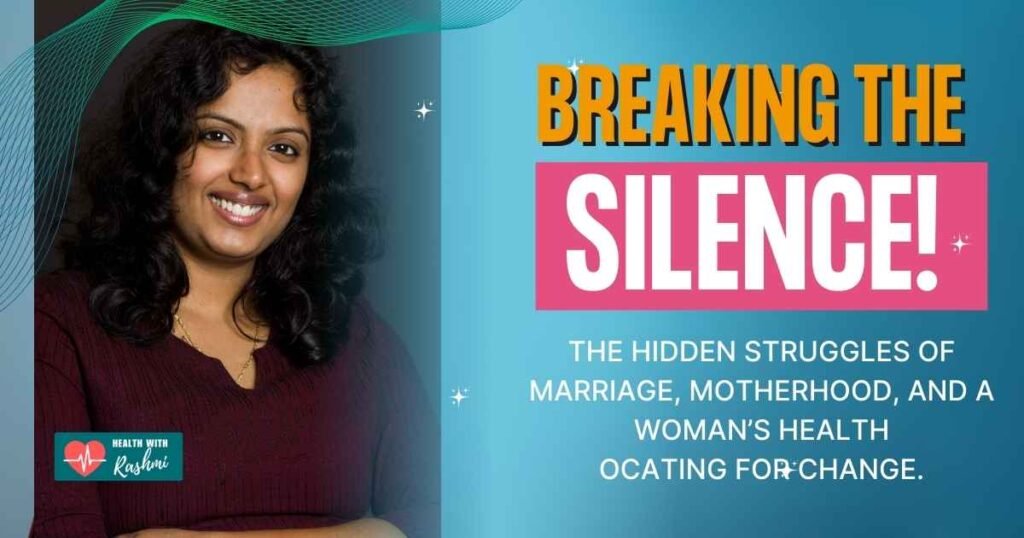Breaking the Silence: The Hidden Struggles of Marriage, Motherhood, and a Woman’s Health

Introduction
Marriage and motherhood are often seen as fulfilling milestones in a woman’s life, but few talk about the silent struggles that come with them. From the moment a woman steps into a new household, she is expected to adapt, nurture, and sacrifice—often at the cost of her own well- being. The pressure to balance responsibilities, meet expectations, and prove herself as a wife, daughter-in-law, and mother can take a serious toll on her mental and physical health. Yet, these challenges are rarely acknowledged, leaving women feeling exhausted, unappreciated, and alone. Meera was one such woman. Ambitious and independent, she had dreams for herself, but after marriage, her life took a different turn.
Marriage: A New Role, A New Battle
When Meera got married, she was excited to build a new life with her husband. But soon, she found herself adjusting to an entirely new family dynamic. Every action—how she cooked, how she spoke, when she woke up—was scrutinized. She was constantly reminded that her primary
role was to care for others.
Health Concerns:
The mental strain of adjusting to a new environment and expectations can cause chronic stress, sleep disorders, digestive issues, and anxiety. Over time, these pressures may contribute to hormonal imbalances and weakened immunity.
How to Protect Your Health:
• Set boundaries with family members and communicate openly.
• Prioritize self-care by taking time for personal activities.
• Seek emotional support from friends, therapists, or support groups.
Motherhood: A Test of Strength and Sacrifice
After two years, Meera became a mother. While she loved her child, the weight of sleepless nights, feeding schedules, and the complete loss of personal space drained her. Her husband, though supportive, assumed she would handle it all. “Mothers just do,” was the unspoken rule.
Health Concerns:
Postpartum depression, chronic fatigue, back pain, and hormonal imbalances are common struggles for new mothers. Nutrient deficiencies and thyroid disorders can also develop due to neglecting self-care.
How to Protect Your Health:
• Ask for help—child-rearing is not a one-person job.
• Ensure proper nutrition with iron, calcium, and vitamin-rich foods.
• Incorporate light exercise like postnatal yoga or daily walks.
• Take mental breaks and acknowledge that rest is essential.
The Constant Pressure of Motherhood and Career
By the time her child started school, Meera felt the pressure to restart her career. However, balancing work and home life felt impossible. She felt guilty for wanting a career and equally guilty for not being fully available for her child. The weight of “doing it all” crushed her.
Health Concerns:
Chronic stress and burnout can lead to thyroid disorders, migraines, digestive issues, and autoimmune diseases. Anxiety and depression can also emerge when women feel trapped in societal expectations.
How to Protect Your Health:
• Share responsibilities with a partner instead of handling everything alone.
• Let go of guilt—your needs matter too.
• Schedule time for yourself to recharge physically and mentally.
The Blame and Emotional Toll of Family Expectations
Whenever issues arose at home—whether it was a child’s performance in school or a disagreement between family members—Meera was often blamed. “You should be more involved,” “You should manage better,” were constant refrains. Society conditions women to believe that they are responsible for the happiness and success of their family, which leads to deep emotional distress.
Health Concerns:
Long-term emotional stress can manifest as heart disease, high blood pressure, or chronic fatigue syndrome. Women who internalize guilt and self-blame are at higher risk of depression and anxiety disorders.
How to Protect Your Health:
• Reject unrealistic expectations—a family’s well-being is a shared responsibility.
• Seek therapy or counseling to process emotions in a healthy way.
• Practice stress management through meditation or deep breathing exercises.
The Need for Change: Standing Up for Oneself
As years passed, Meera realized she had spent too long living for others. She decided to redefine her life—not based on expectations, but on her own needs and happiness. She spoke openly with her husband, set personal goals, and made self-care a priority. It wasn’t easy, but she slowly regained control over her health and well-being.
What Needs to Change?
• Women must advocate for themselves—decisions about marriage, motherhood, and career should be based on personal readiness, not societal pressure.
• Partners and families must share responsibilities rather than placing the burden solely on women.
• Women should prioritize health over expectations—physical and mental well-being must never be sacrificed.
Conclusion
Women like Meera exist everywhere, silently battling expectations that impact their health. But these struggles should not be accepted as normal. Women must reclaim their right to live on their own terms—setting boundaries, making informed decisions, and prioritizing self-care. Only when women begin to stand up for themselves can true change happen.


